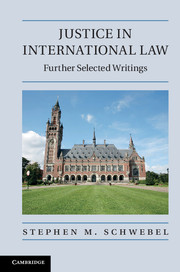Book contents
- Frontmatter
- Contents
- PART I International Court of Justice
- PART II International arbitration
- 12 A BIT about ICSID
- 13 The influence of bilateral investment treaties on customary international law
- 14 The United States 2004 Model Bilateral Investment Treaty: an exercise in the regressive development of international law
- 15 The United States 2004 Model Bilateral Investment Treaty and denial of justice in international law
- 16 Anti-suit injunctions in international arbitration: an overview
- 17 The law applicable in international arbitration: application of public international law
- 18 The validity of an arbitral award rendered by a truncated tribunal
- 19 The authority of a truncated tribunal
- 20 Injunction of arbitral proceedings and truncation of the tribunal
- 21 Public policy and arbitral procedure
- 22 The creation and operation of an International Court of Arbitral Awards
- 23 The Kingdom of Saudi Arabia and Aramco arbitrate the Onassis Agreement
- 24 The Southern Bluefin Tuna case
- 25 A celebration of the United Nations New York Convention on the Recognition and Enforcement of Foreign Arbitral Awards
- 26 Does the consent of the Contracting Parties govern the requirement of an “investment” as specified in Article 25 of the ICSID Convention?
- PART III Miscellaneous
- Collected publications, judicial opinions and book reviews
- Index
18 - The validity of an arbitral award rendered by a truncated tribunal
from PART II - International arbitration
Published online by Cambridge University Press: 07 September 2011
- Frontmatter
- Contents
- PART I International Court of Justice
- PART II International arbitration
- 12 A BIT about ICSID
- 13 The influence of bilateral investment treaties on customary international law
- 14 The United States 2004 Model Bilateral Investment Treaty: an exercise in the regressive development of international law
- 15 The United States 2004 Model Bilateral Investment Treaty and denial of justice in international law
- 16 Anti-suit injunctions in international arbitration: an overview
- 17 The law applicable in international arbitration: application of public international law
- 18 The validity of an arbitral award rendered by a truncated tribunal
- 19 The authority of a truncated tribunal
- 20 Injunction of arbitral proceedings and truncation of the tribunal
- 21 Public policy and arbitral procedure
- 22 The creation and operation of an International Court of Arbitral Awards
- 23 The Kingdom of Saudi Arabia and Aramco arbitrate the Onassis Agreement
- 24 The Southern Bluefin Tuna case
- 25 A celebration of the United Nations New York Convention on the Recognition and Enforcement of Foreign Arbitral Awards
- 26 Does the consent of the Contracting Parties govern the requirement of an “investment” as specified in Article 25 of the ICSID Convention?
- PART III Miscellaneous
- Collected publications, judicial opinions and book reviews
- Index
Summary
It is a privilege to give the Goff Lecture, named as it is in honour of Lord Goff, one of the most distinguished – and engaging – judges of our time. And it is a pleasure to return after too long to Hong Kong, a city of remarkable vitality which today is a center of international commercial arbitration as well as of so much else.
I wish to speak about a problem of international commercial arbitration which is better known as a problem of inter-State arbitration: whether a truncated tribunal has the authority to render a valid award. The problem has been notorious in international law since the inception of modern arbitration late in the eighteenth century. It has reared its ugly head in international commercial arbitration as well.
The problem is this. Where there is the characteristic arbitral tribunal of three arbitrators, one appointed by each party, and a chairman agreed upon by the parties or the party-appointed arbitrators, and where the tribunal duly so constituted embarks upon the proceedings, schedules and receives and studies the pleadings, hears oral argument, and begins or completes its deliberations, or even begins or completes its draft award, and when, at any such point, one of the party-appointed arbitrators withdraws – walks out, indefinitely absents himself, or resigns or purports to – are the remaining two arbitrators entitled in law to render a valid award?
- Type
- Chapter
- Information
- Justice in International LawFurther Selected Writings, pp. 182 - 205Publisher: Cambridge University PressPrint publication year: 2011



